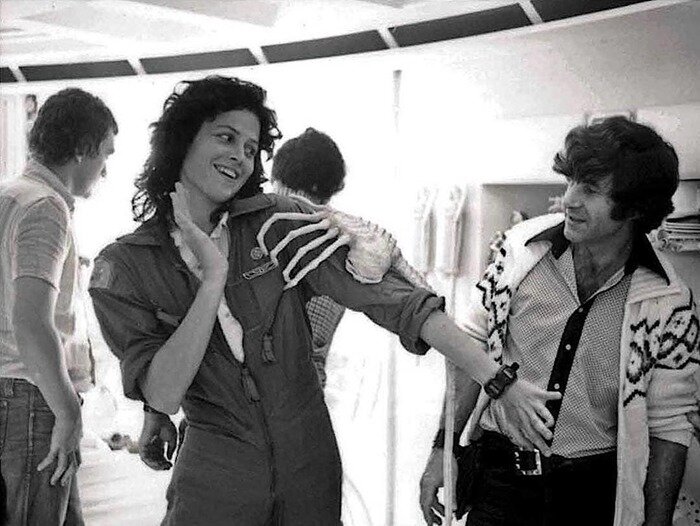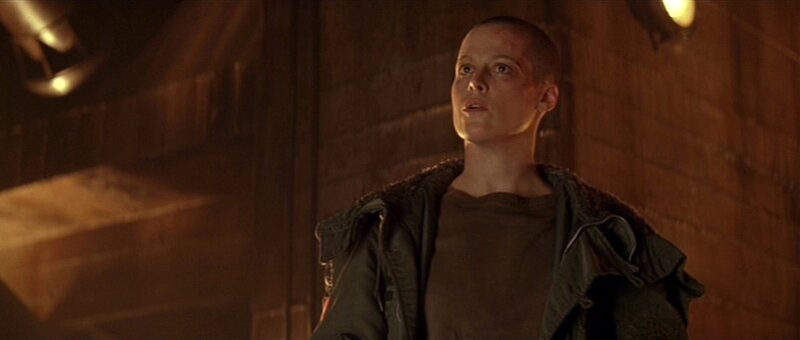A Hero Without Commentary : The Endurance of Ellen Ripley
Ellen Ripley. ALIEN. 1979.
I’ve written about (Ellen) Ripley more times than I can count. She’s a character that will probably be on my mind when I take my last breath. I attribute the personhood of Ripley to be in part responsible for me surviving my teenage years. Conversations surrounding who she is, what she is and how she became will never be something I shy away from.
The story of Ripley as an icon of science fiction is not one that’s gone unnoticed. From an endearing and loyal fanbase, to the many iterations of her in the years since her death in Alien 3; Ripley has endured the test of time, and yes, she happens to be a woman.
The discussions around Ripley’s genius as a character has largely danced around two stalwart ideas, her character’s writing, and the indelible and timeless performance by Sigourney Weaver. Ripley and Weaver are so intertwined, there’s little delineation at this point.
As history tells us, the role of Ripley wasn’t gendered by writer Dan O’Bannon.
Sigourney Weaver on the set of ALIEN. 1978.
“Everyone’s gender in the script was deliberately left up in the air. I figured that the gender of each character would be determined at the time they were cast, and I wrote that into the first script, it’s right there on the last page.”
Originally John Travolta was considered to play Ripley, then out of nowhere, “they came up with this Sigourney Weaver gal. They actually did a screen test with her, and everybody was favorably impressed.”
I don’t see it as that revolutionary to cast a female as the lead in an action picture. It didn’t boggle me then, and it doesn’t boggle me now. My conception from scratch was that this would be a co-ed crew. I thought there was no reason you had to adhere to the convention of the all-male crew anymore. Plus it was in 1976 that I was writing the thing, and it just seemed like an obvious thing to do. I mean Star Trek had women on for years.”
-Dan O’Bannon
Ripley. ALIENS. 1986.
The miracle that is the character of Ellen Ripley did not happen solely because she was written as genderless. When Weaver was eventually cast, the character itself became gendered. In Ridley Scott’s film there were hints that the character of Ripley was or had been involved with Dallas, (played brilliantly by Tom Skerritt). Ripley was very much a woman, while also holding her own as a second officer aboard the star ship Nostromo.
When audiences were introduced to Ripley in the summer of 1979, they took her at face value. By the end of the film you were with her. Ripley’s will to live, leadership and survival skills allowed her to climb into the hearts of fans far and wide. This entrenchment around her would only increase with each sequel, specifically, James Cameron’s ALIENS, released in 1986. During the lead up to production, Weaver herself was adamant that her character not wield a gun unless she had to. She knew that Ripley’s strength came from the integrity of her character, and not the weapon she was carrying. As divisive and divided as fans became with the release of Alien 3 in 1992, Ripley was still a figure of reverence and respect, despite the reaction to the story choices made in the film.
Alien3. 1992.
The success of Ripley as an icon is also due to a lack of commentary on what she represented. Ripley was written and performed without an agenda attached to her. It’s that simple. It could have been easy to make her gender something larger than it was. Over the years she’s been called a feminist icon, leading the way in a very male dominated industry and genre. However there was no feminist narrative that accompanied the announcement of Weaver’s casting, no war cry against men at what a female-led science fiction picture might mean for the future of the genre.
Ripley just was.
Movie audiences have always been adept. When people stream into theaters, they also do so without agenda. Audiences hope and expect to have a good time while being engaged. The social climate is ever-changing and it is salient that films and shows accurately represent everyone. The caveat is that representation and commentary should not come at the cost of a good story, or good characters.
Audiences will interpret a film in their own way, through their own lens. A good story will speak to many different people in many different ways. An engaging and well-crafted film doesn’t warrant an explanation beforehand, nor does it require producers and studio executives making public statements about its intent. These kinds of sentiments only prove to hurt the the success of the film/s, not help.
Social media has given everyone a platform for commentary. We are a global society that’s commentary-driven for every minutiae of news that breaks. When a film is released theatrically or via streaming, not only will it be met with a tidal wave of critical reviews in its first stage, it will have to go up against its biggest adversary of survival, viewer commentary.
Brie Larsen as Captain Marvel.
There was a time when movies could be released without any noise preceding them. Directors and studios would complete their films, and release them into the world without a sound. Moviegoers would decide for themselves if what they’re seeing was worth their time. Those days are gone.
Ellen Ripley was able to succeed because there was no one speaking for her or before filmgoers had a chance to experience her for themselves. Ripley lives on as an icon, not because she wielded a gun, or that she was a mother, or that she commanded soldiers. Ripley lives on because she is a good character with integrity and we all accepted her and believed her as she was, without agenda.
Jaime Prater
for Perfect Organism: The Alien Saga Podcast
perfectorganismpodcast@gmail.com
@SoundgoAsunder





